COMM 102: China's Internet Censorship: Degree vs. Absolute Difference
VerifiedAdded on 2023/04/07
|6
|1400
|115
Homework Assignment
AI Summary
This assignment addresses the question of whether the difference between China's internet control and that of Western states is one of degree or absolute difference. The analysis begins by outlining China's extensive measures to regulate and censor internet content, including blocking access to major platforms like Google and Facebook, restricting foreign content, and requiring party membership within Chinese tech companies. The assignment references the knowledge, security, and surveillance economies, and ultimately concludes that China's control is significantly more extensive than in many other countries, though some European nations also have censorship. The second part of the assignment explains and discusses the knowledge, security, and surveillance economies, and analyzes the political-economy of Canada in relation to these. The author concludes that the Canadian economy is not a knowledge economy, nor a security economy. The structure of the Canadian economy is more complex and it is difficult to fit it in one of the three categories. References are provided to support the arguments.
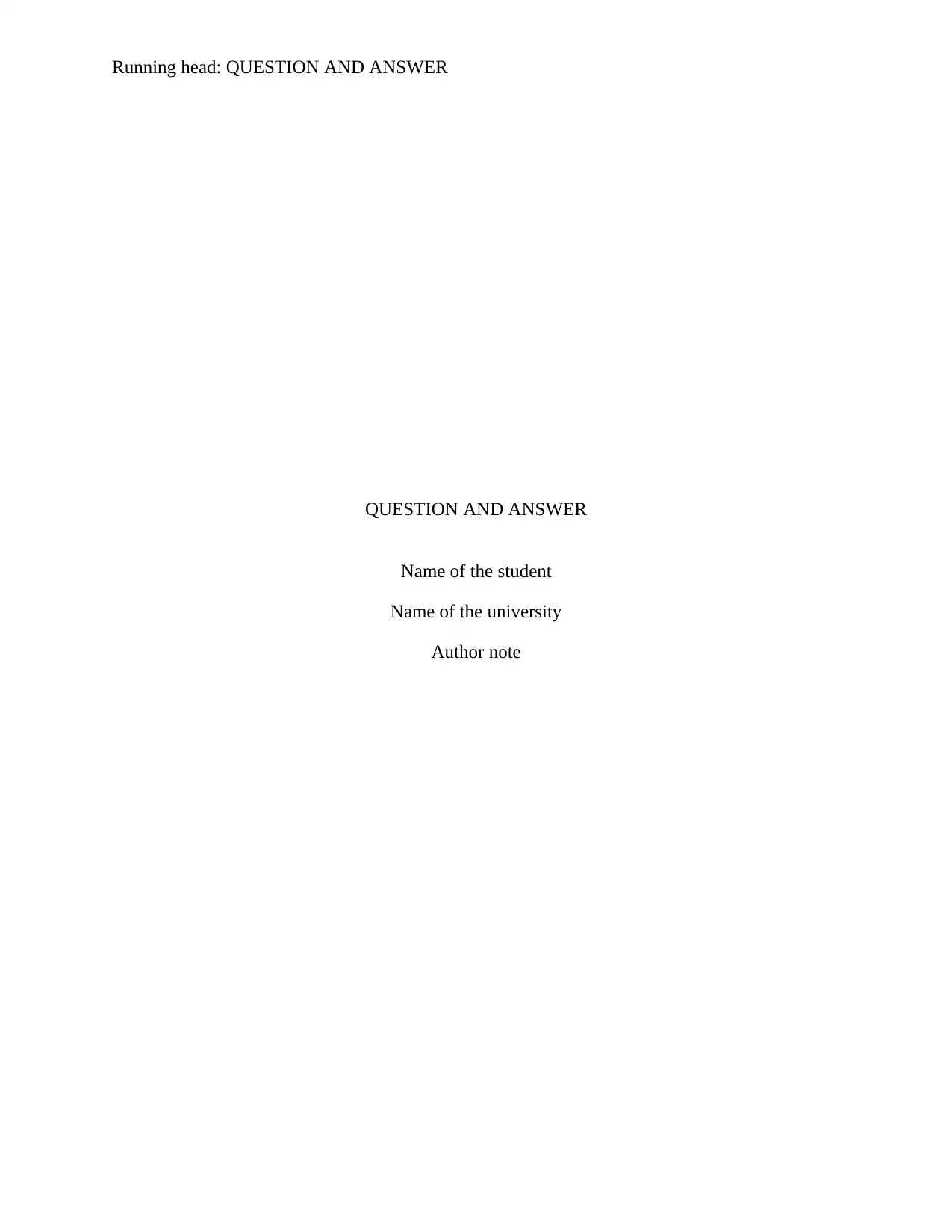
Running head: QUESTION AND ANSWER
QUESTION AND ANSWER
Name of the student
Name of the university
Author note
QUESTION AND ANSWER
Name of the student
Name of the university
Author note
Paraphrase This Document
Need a fresh take? Get an instant paraphrase of this document with our AI Paraphraser
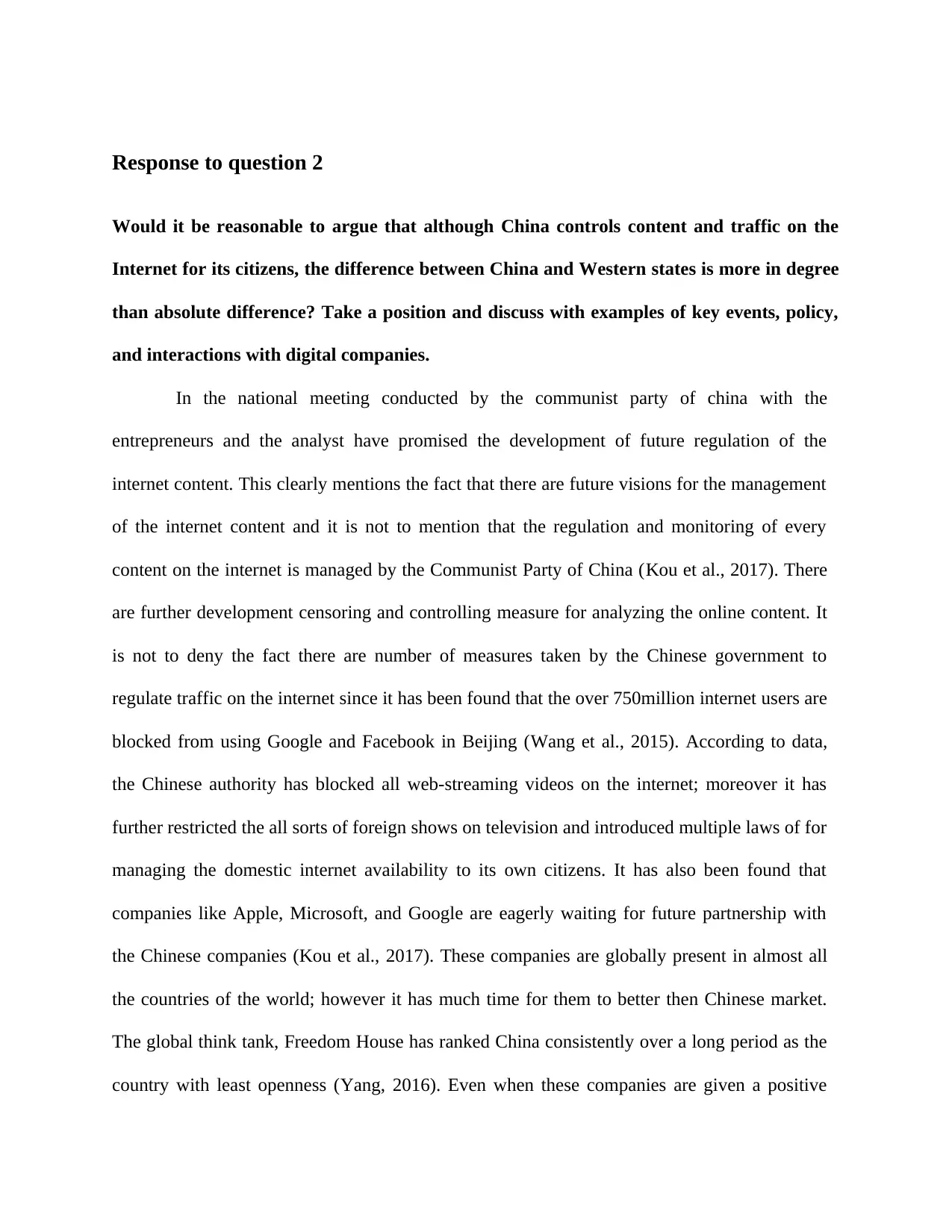
Response to question 2
Would it be reasonable to argue that although China controls content and traffic on the
Internet for its citizens, the difference between China and Western states is more in degree
than absolute difference? Take a position and discuss with examples of key events, policy,
and interactions with digital companies.
In the national meeting conducted by the communist party of china with the
entrepreneurs and the analyst have promised the development of future regulation of the
internet content. This clearly mentions the fact that there are future visions for the management
of the internet content and it is not to mention that the regulation and monitoring of every
content on the internet is managed by the Communist Party of China (Kou et al., 2017). There
are further development censoring and controlling measure for analyzing the online content. It
is not to deny the fact there are number of measures taken by the Chinese government to
regulate traffic on the internet since it has been found that the over 750million internet users are
blocked from using Google and Facebook in Beijing (Wang et al., 2015). According to data,
the Chinese authority has blocked all web-streaming videos on the internet; moreover it has
further restricted the all sorts of foreign shows on television and introduced multiple laws of for
managing the domestic internet availability to its own citizens. It has also been found that
companies like Apple, Microsoft, and Google are eagerly waiting for future partnership with
the Chinese companies (Kou et al., 2017). These companies are globally present in almost all
the countries of the world; however it has much time for them to better then Chinese market.
The global think tank, Freedom House has ranked China consistently over a long period as the
country with least openness (Yang, 2016). Even when these companies are given a positive
Would it be reasonable to argue that although China controls content and traffic on the
Internet for its citizens, the difference between China and Western states is more in degree
than absolute difference? Take a position and discuss with examples of key events, policy,
and interactions with digital companies.
In the national meeting conducted by the communist party of china with the
entrepreneurs and the analyst have promised the development of future regulation of the
internet content. This clearly mentions the fact that there are future visions for the management
of the internet content and it is not to mention that the regulation and monitoring of every
content on the internet is managed by the Communist Party of China (Kou et al., 2017). There
are further development censoring and controlling measure for analyzing the online content. It
is not to deny the fact there are number of measures taken by the Chinese government to
regulate traffic on the internet since it has been found that the over 750million internet users are
blocked from using Google and Facebook in Beijing (Wang et al., 2015). According to data,
the Chinese authority has blocked all web-streaming videos on the internet; moreover it has
further restricted the all sorts of foreign shows on television and introduced multiple laws of for
managing the domestic internet availability to its own citizens. It has also been found that
companies like Apple, Microsoft, and Google are eagerly waiting for future partnership with
the Chinese companies (Kou et al., 2017). These companies are globally present in almost all
the countries of the world; however it has much time for them to better then Chinese market.
The global think tank, Freedom House has ranked China consistently over a long period as the
country with least openness (Yang, 2016). Even when these companies are given a positive
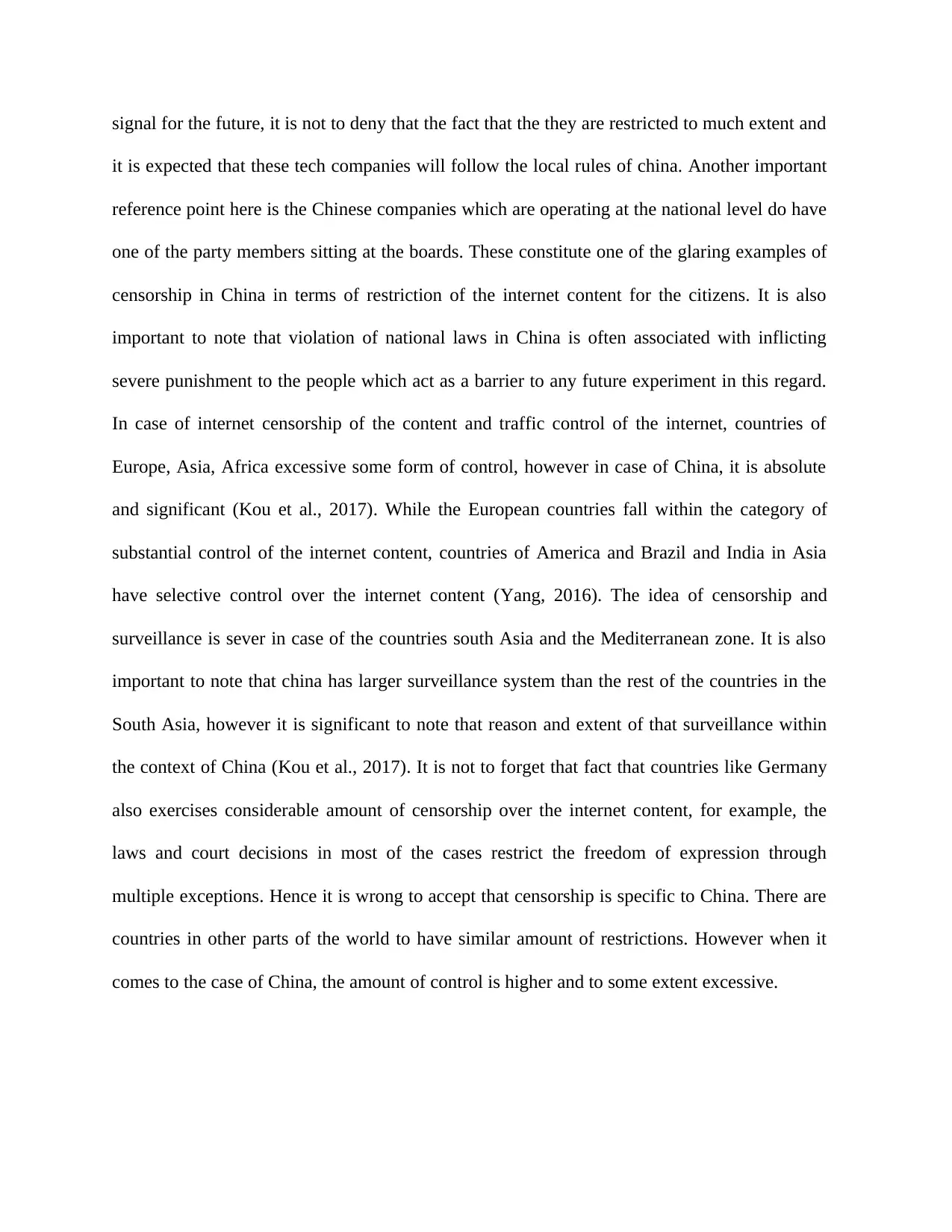
signal for the future, it is not to deny that the fact that the they are restricted to much extent and
it is expected that these tech companies will follow the local rules of china. Another important
reference point here is the Chinese companies which are operating at the national level do have
one of the party members sitting at the boards. These constitute one of the glaring examples of
censorship in China in terms of restriction of the internet content for the citizens. It is also
important to note that violation of national laws in China is often associated with inflicting
severe punishment to the people which act as a barrier to any future experiment in this regard.
In case of internet censorship of the content and traffic control of the internet, countries of
Europe, Asia, Africa excessive some form of control, however in case of China, it is absolute
and significant (Kou et al., 2017). While the European countries fall within the category of
substantial control of the internet content, countries of America and Brazil and India in Asia
have selective control over the internet content (Yang, 2016). The idea of censorship and
surveillance is sever in case of the countries south Asia and the Mediterranean zone. It is also
important to note that china has larger surveillance system than the rest of the countries in the
South Asia, however it is significant to note that reason and extent of that surveillance within
the context of China (Kou et al., 2017). It is not to forget that fact that countries like Germany
also exercises considerable amount of censorship over the internet content, for example, the
laws and court decisions in most of the cases restrict the freedom of expression through
multiple exceptions. Hence it is wrong to accept that censorship is specific to China. There are
countries in other parts of the world to have similar amount of restrictions. However when it
comes to the case of China, the amount of control is higher and to some extent excessive.
it is expected that these tech companies will follow the local rules of china. Another important
reference point here is the Chinese companies which are operating at the national level do have
one of the party members sitting at the boards. These constitute one of the glaring examples of
censorship in China in terms of restriction of the internet content for the citizens. It is also
important to note that violation of national laws in China is often associated with inflicting
severe punishment to the people which act as a barrier to any future experiment in this regard.
In case of internet censorship of the content and traffic control of the internet, countries of
Europe, Asia, Africa excessive some form of control, however in case of China, it is absolute
and significant (Kou et al., 2017). While the European countries fall within the category of
substantial control of the internet content, countries of America and Brazil and India in Asia
have selective control over the internet content (Yang, 2016). The idea of censorship and
surveillance is sever in case of the countries south Asia and the Mediterranean zone. It is also
important to note that china has larger surveillance system than the rest of the countries in the
South Asia, however it is significant to note that reason and extent of that surveillance within
the context of China (Kou et al., 2017). It is not to forget that fact that countries like Germany
also exercises considerable amount of censorship over the internet content, for example, the
laws and court decisions in most of the cases restrict the freedom of expression through
multiple exceptions. Hence it is wrong to accept that censorship is specific to China. There are
countries in other parts of the world to have similar amount of restrictions. However when it
comes to the case of China, the amount of control is higher and to some extent excessive.
⊘ This is a preview!⊘
Do you want full access?
Subscribe today to unlock all pages.

Trusted by 1+ million students worldwide
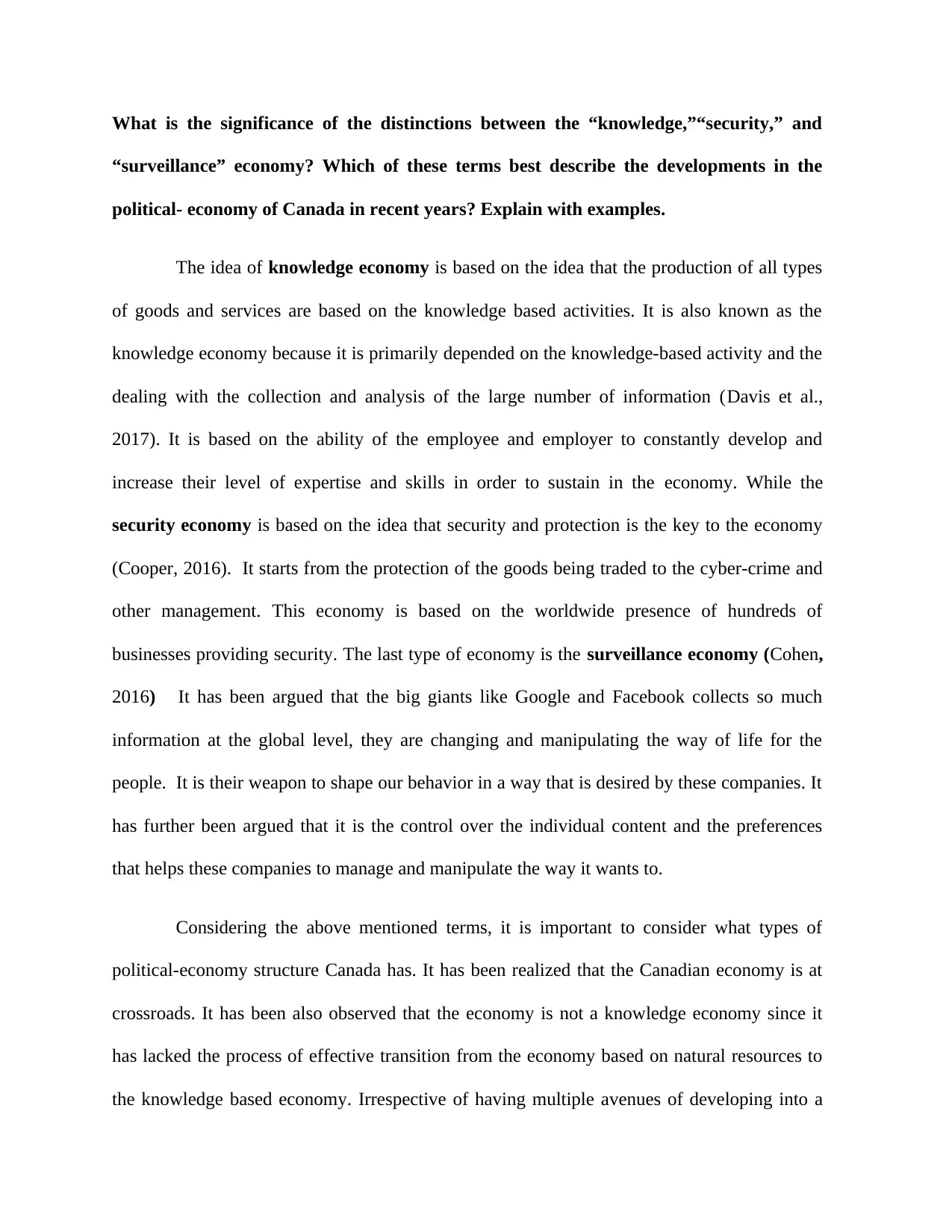
What is the significance of the distinctions between the “knowledge,”“security,” and
“surveillance” economy? Which of these terms best describe the developments in the
political- economy of Canada in recent years? Explain with examples.
The idea of knowledge economy is based on the idea that the production of all types
of goods and services are based on the knowledge based activities. It is also known as the
knowledge economy because it is primarily depended on the knowledge-based activity and the
dealing with the collection and analysis of the large number of information (Davis et al.,
2017). It is based on the ability of the employee and employer to constantly develop and
increase their level of expertise and skills in order to sustain in the economy. While the
security economy is based on the idea that security and protection is the key to the economy
(Cooper, 2016). It starts from the protection of the goods being traded to the cyber-crime and
other management. This economy is based on the worldwide presence of hundreds of
businesses providing security. The last type of economy is the surveillance economy (Cohen,
2016) It has been argued that the big giants like Google and Facebook collects so much
information at the global level, they are changing and manipulating the way of life for the
people. It is their weapon to shape our behavior in a way that is desired by these companies. It
has further been argued that it is the control over the individual content and the preferences
that helps these companies to manage and manipulate the way it wants to.
Considering the above mentioned terms, it is important to consider what types of
political-economy structure Canada has. It has been realized that the Canadian economy is at
crossroads. It has been also observed that the economy is not a knowledge economy since it
has lacked the process of effective transition from the economy based on natural resources to
the knowledge based economy. Irrespective of having multiple avenues of developing into a
“surveillance” economy? Which of these terms best describe the developments in the
political- economy of Canada in recent years? Explain with examples.
The idea of knowledge economy is based on the idea that the production of all types
of goods and services are based on the knowledge based activities. It is also known as the
knowledge economy because it is primarily depended on the knowledge-based activity and the
dealing with the collection and analysis of the large number of information (Davis et al.,
2017). It is based on the ability of the employee and employer to constantly develop and
increase their level of expertise and skills in order to sustain in the economy. While the
security economy is based on the idea that security and protection is the key to the economy
(Cooper, 2016). It starts from the protection of the goods being traded to the cyber-crime and
other management. This economy is based on the worldwide presence of hundreds of
businesses providing security. The last type of economy is the surveillance economy (Cohen,
2016) It has been argued that the big giants like Google and Facebook collects so much
information at the global level, they are changing and manipulating the way of life for the
people. It is their weapon to shape our behavior in a way that is desired by these companies. It
has further been argued that it is the control over the individual content and the preferences
that helps these companies to manage and manipulate the way it wants to.
Considering the above mentioned terms, it is important to consider what types of
political-economy structure Canada has. It has been realized that the Canadian economy is at
crossroads. It has been also observed that the economy is not a knowledge economy since it
has lacked the process of effective transition from the economy based on natural resources to
the knowledge based economy. Irrespective of having multiple avenues of developing into a
Paraphrase This Document
Need a fresh take? Get an instant paraphrase of this document with our AI Paraphraser
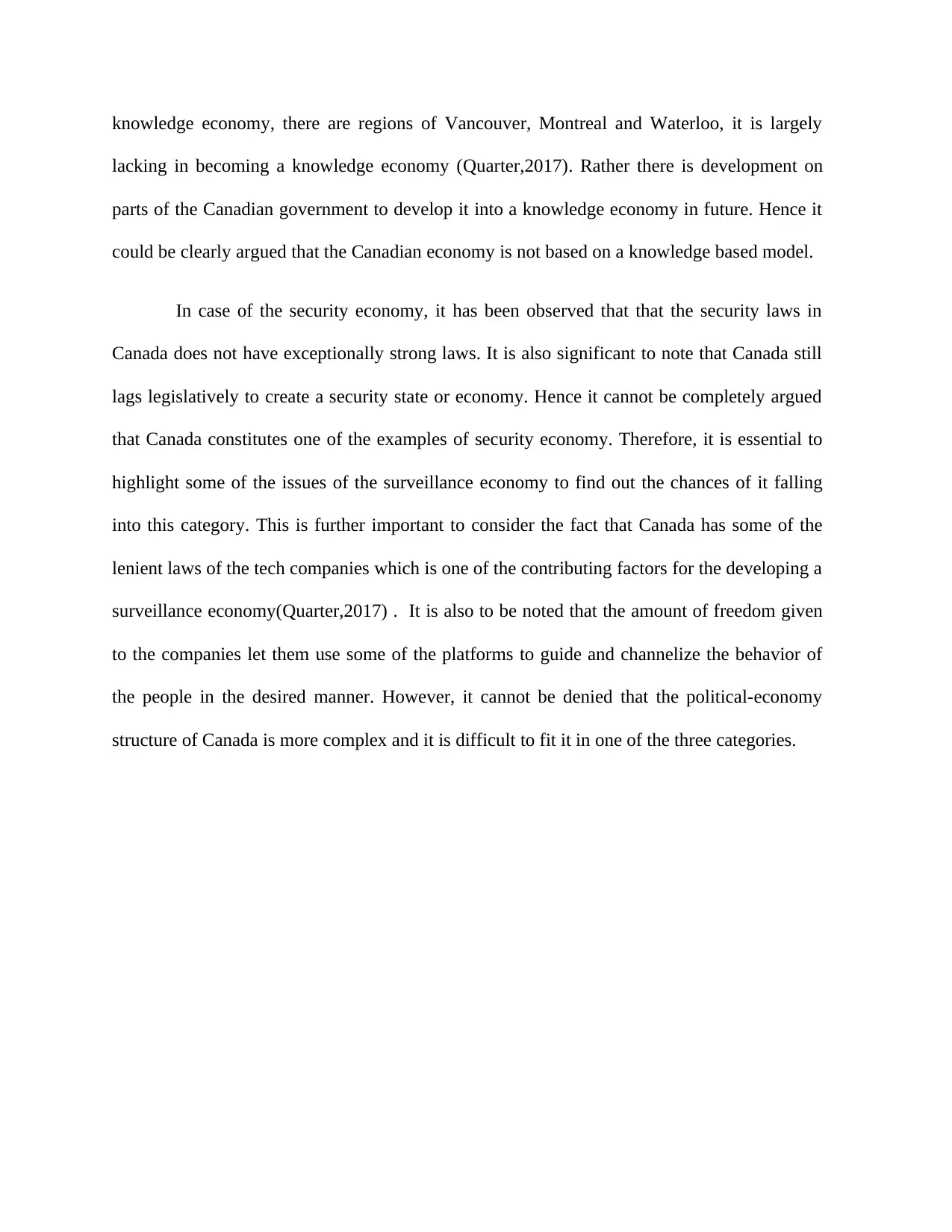
knowledge economy, there are regions of Vancouver, Montreal and Waterloo, it is largely
lacking in becoming a knowledge economy (Quarter,2017). Rather there is development on
parts of the Canadian government to develop it into a knowledge economy in future. Hence it
could be clearly argued that the Canadian economy is not based on a knowledge based model.
In case of the security economy, it has been observed that that the security laws in
Canada does not have exceptionally strong laws. It is also significant to note that Canada still
lags legislatively to create a security state or economy. Hence it cannot be completely argued
that Canada constitutes one of the examples of security economy. Therefore, it is essential to
highlight some of the issues of the surveillance economy to find out the chances of it falling
into this category. This is further important to consider the fact that Canada has some of the
lenient laws of the tech companies which is one of the contributing factors for the developing a
surveillance economy(Quarter,2017) . It is also to be noted that the amount of freedom given
to the companies let them use some of the platforms to guide and channelize the behavior of
the people in the desired manner. However, it cannot be denied that the political-economy
structure of Canada is more complex and it is difficult to fit it in one of the three categories.
lacking in becoming a knowledge economy (Quarter,2017). Rather there is development on
parts of the Canadian government to develop it into a knowledge economy in future. Hence it
could be clearly argued that the Canadian economy is not based on a knowledge based model.
In case of the security economy, it has been observed that that the security laws in
Canada does not have exceptionally strong laws. It is also significant to note that Canada still
lags legislatively to create a security state or economy. Hence it cannot be completely argued
that Canada constitutes one of the examples of security economy. Therefore, it is essential to
highlight some of the issues of the surveillance economy to find out the chances of it falling
into this category. This is further important to consider the fact that Canada has some of the
lenient laws of the tech companies which is one of the contributing factors for the developing a
surveillance economy(Quarter,2017) . It is also to be noted that the amount of freedom given
to the companies let them use some of the platforms to guide and channelize the behavior of
the people in the desired manner. However, it cannot be denied that the political-economy
structure of Canada is more complex and it is difficult to fit it in one of the three categories.
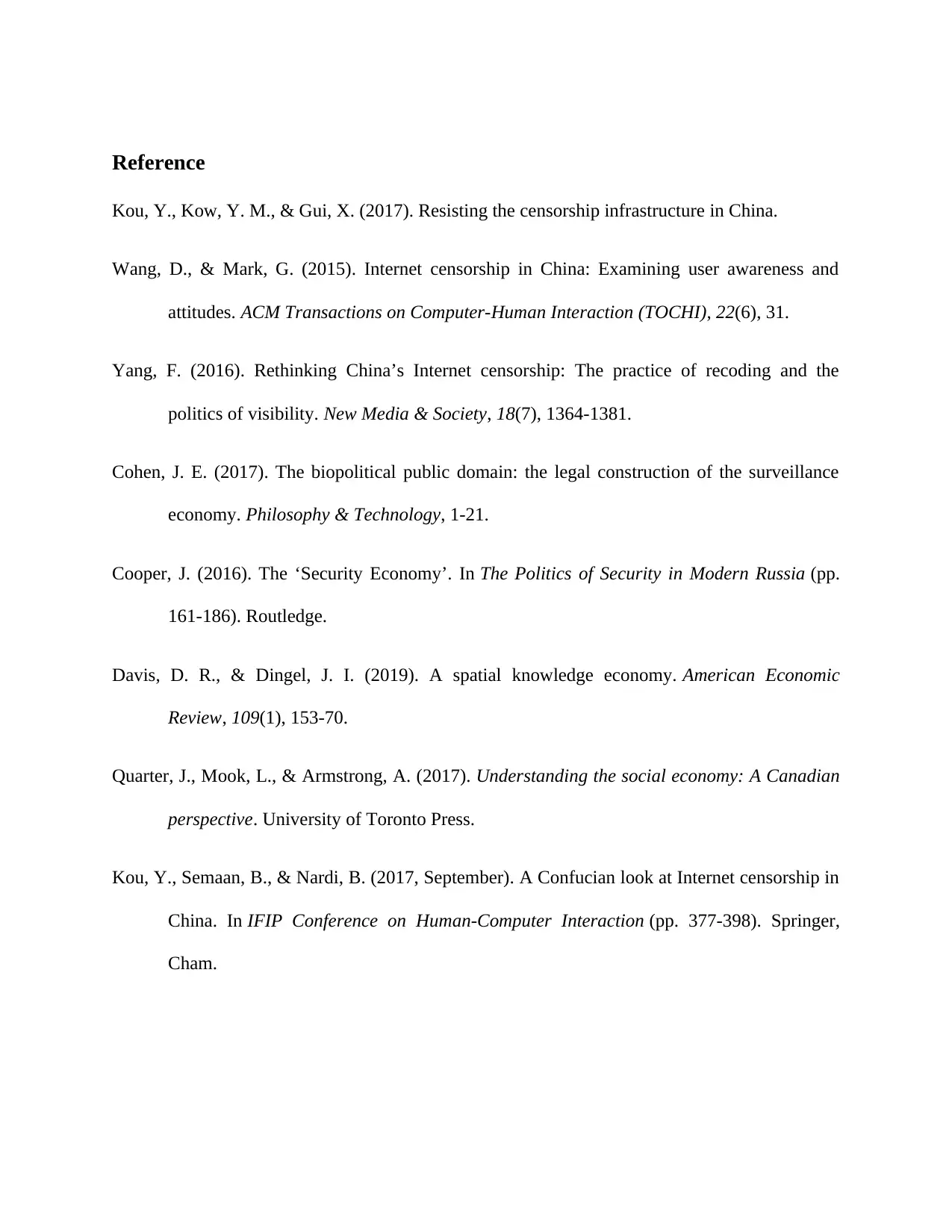
Reference
Kou, Y., Kow, Y. M., & Gui, X. (2017). Resisting the censorship infrastructure in China.
Wang, D., & Mark, G. (2015). Internet censorship in China: Examining user awareness and
attitudes. ACM Transactions on Computer-Human Interaction (TOCHI), 22(6), 31.
Yang, F. (2016). Rethinking China’s Internet censorship: The practice of recoding and the
politics of visibility. New Media & Society, 18(7), 1364-1381.
Cohen, J. E. (2017). The biopolitical public domain: the legal construction of the surveillance
economy. Philosophy & Technology, 1-21.
Cooper, J. (2016). The ‘Security Economy’. In The Politics of Security in Modern Russia (pp.
161-186). Routledge.
Davis, D. R., & Dingel, J. I. (2019). A spatial knowledge economy. American Economic
Review, 109(1), 153-70.
Quarter, J., Mook, L., & Armstrong, A. (2017). Understanding the social economy: A Canadian
perspective. University of Toronto Press.
Kou, Y., Semaan, B., & Nardi, B. (2017, September). A Confucian look at Internet censorship in
China. In IFIP Conference on Human-Computer Interaction (pp. 377-398). Springer,
Cham.
Kou, Y., Kow, Y. M., & Gui, X. (2017). Resisting the censorship infrastructure in China.
Wang, D., & Mark, G. (2015). Internet censorship in China: Examining user awareness and
attitudes. ACM Transactions on Computer-Human Interaction (TOCHI), 22(6), 31.
Yang, F. (2016). Rethinking China’s Internet censorship: The practice of recoding and the
politics of visibility. New Media & Society, 18(7), 1364-1381.
Cohen, J. E. (2017). The biopolitical public domain: the legal construction of the surveillance
economy. Philosophy & Technology, 1-21.
Cooper, J. (2016). The ‘Security Economy’. In The Politics of Security in Modern Russia (pp.
161-186). Routledge.
Davis, D. R., & Dingel, J. I. (2019). A spatial knowledge economy. American Economic
Review, 109(1), 153-70.
Quarter, J., Mook, L., & Armstrong, A. (2017). Understanding the social economy: A Canadian
perspective. University of Toronto Press.
Kou, Y., Semaan, B., & Nardi, B. (2017, September). A Confucian look at Internet censorship in
China. In IFIP Conference on Human-Computer Interaction (pp. 377-398). Springer,
Cham.
⊘ This is a preview!⊘
Do you want full access?
Subscribe today to unlock all pages.

Trusted by 1+ million students worldwide
1 out of 6
Related Documents
Your All-in-One AI-Powered Toolkit for Academic Success.
+13062052269
info@desklib.com
Available 24*7 on WhatsApp / Email
![[object Object]](/_next/static/media/star-bottom.7253800d.svg)
Unlock your academic potential
Copyright © 2020–2026 A2Z Services. All Rights Reserved. Developed and managed by ZUCOL.





